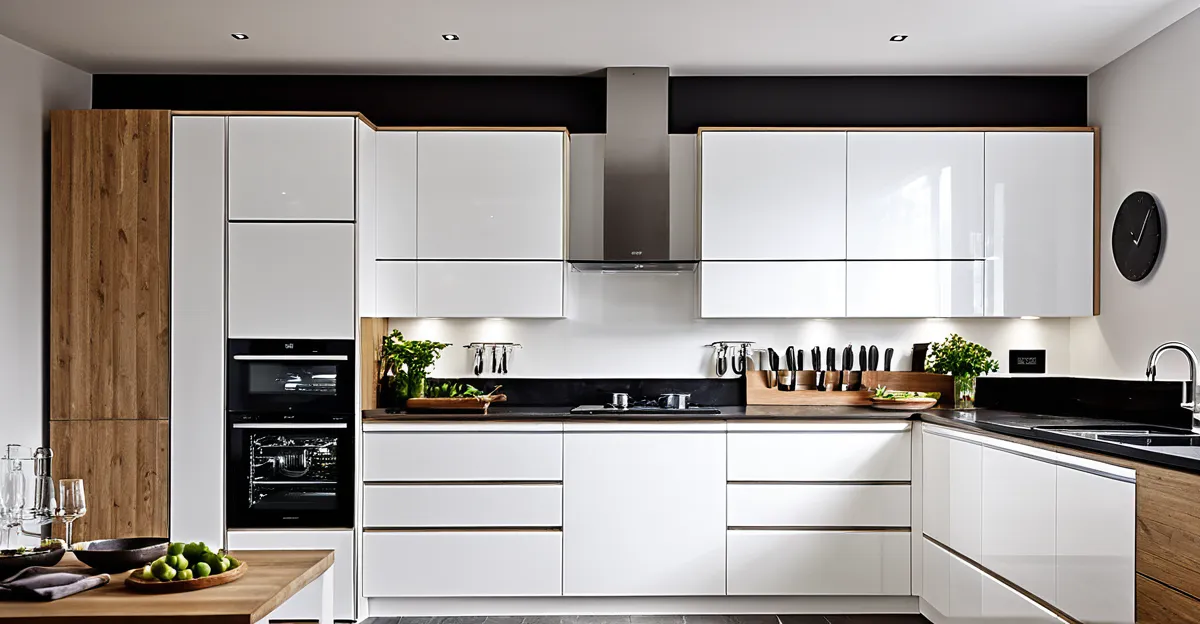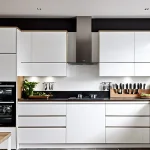Smart Appliances Transforming UK Kitchens
Smart appliances UK have rapidly evolved, reshaping how Britons approach cooking and kitchen management. The rise of kitchen technology has introduced devices that integrate connectivity, automation, and user-friendly interfaces, allowing users to control ovens, refrigerators, and dishwashers remotely via apps or voice commands.
Current smart kitchen trends reveal a shift towards energy-efficient, multifunctional appliances that save time and reduce waste. For example, refrigerators now feature internal cameras and inventory tracking, enabling users to monitor supplies and plan meals with greater precision. These advancements enable smarter grocery shopping and less food spoilage.
Have you seen this : Revolutionizing uk kitchens: the impact of smart appliance integration on functionality
In the UK, early adoption of smart appliances has predominantly occurred among tech-savvy consumers keen to enhance convenience. However, mainstream integration is accelerating thanks to falling costs and increased awareness. Homeowners across Britain are now embracing smart kitchen trends not only for novelty but also for practical benefits such as improved energy efficiency and enhanced cooking precision. This gradual transformation highlights a clear trajectory where smart appliances UK become indispensable in modern British kitchens.
Key Benefits of Smart Kitchen Appliances
Smart kitchen appliances significantly boost kitchen efficiency UK by streamlining everyday cooking and cleaning processes. These devices reduce the time spent on routine tasks, allowing users to focus on other priorities without compromising meal quality. For instance, smart ovens with preset cooking modes adapt to various recipes, ensuring precise results without manual monitoring. This enhanced efficiency translates into a smoother kitchen workflow throughout the day.
Also read : Exploring the uk market’s reaction to the surge in open-plan kitchen demand
The convenience offered by these appliances fits diverse household needs perfectly. Features like remote control via apps enable users to start, stop, or adjust cooking programs from anywhere, making multitasking easier. Additionally, smart refrigerators can monitor food inventory, suggest recipes, and even alert owners when items are running low, promoting better meal planning and reducing food waste. This level of convenience adapts well to busy lifestyles, supporting a hassle-free kitchen experience.
Energy-saving appliances also play a crucial role in reducing overall household energy consumption. Modern smart appliances incorporate sensors and optimal power usage algorithms that adjust their operation to minimize electricity use without sacrificing performance. Over time, these energy-saving measures contribute to noticeable reductions in utility bills, making them economically attractive. Moreover, by curbing energy waste, they support environmental sustainability efforts important to many UK households today.
Together, these benefits position smart kitchen appliances as valuable additions for those seeking to enhance their home’s functionality, convenience, and eco-friendliness.
Real-World Impact: Case Studies and User Experiences
Discoveries from smart kitchen case studies reveal how UK households increasingly embrace technology to enhance their culinary spaces. These case studies highlight transformations where traditional kitchens are revamped into efficient, connected hubs equipped with automation and smart appliances, offering both convenience and energy savings.
User testimonials from UK homeowners provide authentic insights into the real benefits and occasional hurdles of adopting smart kitchen technology. Many users praise the ease of controlling appliances remotely, voice-activated commands, and streamlined meal preparation processes. However, they also report a learning curve linked to integrating new devices and software, emphasizing the importance of user-friendly interfaces and reliable customer support.
Common challenges include compatibility issues among devices and initial setup complexities, which can be overcome with proper guidance. These experiences underscore the evolving nature of smart kitchen adoption, encouraging potential users to approach the transition with both enthusiasm and preparedness.
Expert Opinions and Industry Insights
Insights from expert perspectives in the appliance industry reveal that the integration of smart technologies is reshaping kitchen spaces across the UK. Leaders in appliance technology emphasize how connectivity and user-friendly interfaces are becoming standard expectations for consumers, enhancing convenience and efficiency in everyday cooking.
Analysis from appliance technology leaders
Appliance industry experts highlight innovations like voice-activated controls, AI-based cooking assistants, and energy-efficient designs as key drivers for the next generation of kitchen appliances. They note that successful products strike a balance between advanced features and intuitive usability, making technology accessible for all skill levels.
Professional insights from UK kitchen designers
Renowned UK kitchen designers stress that kitchen design UK must now harmonize aesthetics with technology integration. They recommend thoughtful layouts that accommodate smart appliances without compromising style. Designers encourage homeowners to consider how technological elements can complement traditional kitchen aesthetics, ensuring a seamless blend that enhances usability.
Commentary on future kitchen technology trends
Looking ahead, industry insiders predict increased emphasis on sustainability and customization. Future trends point toward appliances capable of monitoring food freshness, reducing waste, and adapting to individual cooking habits. The collaboration between designers and appliance manufacturers is expected to intensify, driving innovations that redefine the kitchen environment in the UK.
The Evolving Role of Smart Appliances in Everyday Routines and Design
Smart appliances have significantly reshaped kitchen routines across many households. Modern culinary habits now often revolve around devices that simplify meal preparation, from programmable ovens to voice-activated refrigerators. These technologies allow users to automate tasks such as preheating, ingredient monitoring, and timed cooking, streamlining what was once a series of manual steps.
This integration extends beyond functionality, influencing smart kitchen design in noticeable ways. In the UK, home layouts increasingly accommodate these appliances by prioritizing flexible spaces and connectivity. Kitchens are no longer just cooking areas; they serve as hubs for digital interactions, blending convenience with aesthetic appeal to meet contemporary lifestyle demands.
Furthermore, the adoption of smart appliances is transforming modern culinary habits by blending tradition with innovation. While classic recipes remain cherished, technology enables new methods of preparation and experimentation, supporting healthier choices and efficiency. This shift enhances the way people approach food, making cooking both an art and a science supported by smart technology.


